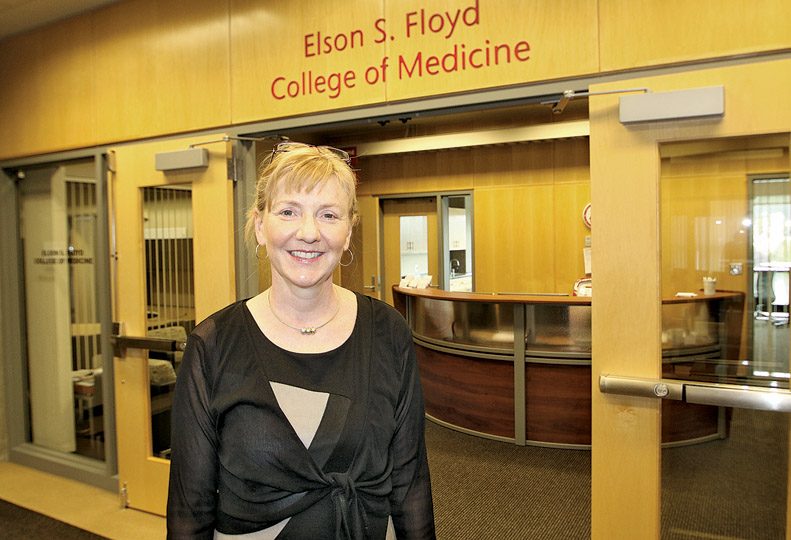
Home » WSU vice dean is eager to help shape new medical school's culture
WSU vice dean is eager to help shape new medical school's culture
DeWitt aims for inclusive, unique student experience

October 6, 2016
With an M.D. from Harvard Medical School, Dr. Dawn DeWitt has held academic positions and been an attending physician in three countries.
But now she thinks she has potentially the best chance in her career to make an impact in the medical field as the new vice dean for student and faculty experience at Washington State University’s Elson S. Floyd College of Medicine.
“It’s a chance to create a new medical school from the ground up and help make it the best it can be,” DeWitt says.
Washington State University is currently in the process of preparing to open a medical school in Spokane a year from now. The Elson S. Floyd College of Medicine is expected to have 60 medical students next year, assuming final accreditation approval, on the WSU campus.
DeWitt has held administrative and faculty positions at universities in the U.S., Canada, and Australia. Before coming to WSU, she was the associate dean for undergraduate medical education at the University of British Columbia, in Vancouver.
DeWitt also has held a variety of positions at the University of Melbourne in Australia, including associate dean for rural health in the faculty of medicine, dentistry, and health sciences.
In her current role, DeWitt says she wants to help WSU’s college of medicine become an institution that embraces students and faculty of all backgrounds.
Recently, she says she attended her Harvard Medical School reunion. As she toured the medical school facilities, she was struck by the fact that there were countless “busts of men”—the medical school’s version of its hall of fame, so to speak—that were placed in prominent locations throughout the buildings.
The busts are of men who were highly regarded as students and faculty members at Harvard over the course of that med school’s 234-year history.
“During the tour, I was with a group of people, and we went down this obscure stairwell to get to another location, and there, hanging on a stairwell wall was a picture with small portraits of women in it that were determined to have had an influence at Harvard,” DeWitt says. “It just really struck me that despite the fact the majority of med school students today are women, the culture of medical schools is still largely determined and dominated by men.”
She says even though white women are no longer underrepresented in medical schools across the country, African-American and Hispanic women are highly underrepresented. And Native American women are “barely represented” in med schools.
WSU’s medical school hired Dr. Yvette Roubideaux as its associate dean for diversity, inclusion and leadership at about the same time it hired DeWitt.
Roubideaux is a member of the Sioux Tribe from South Dakota. Before being hired at WSU, she served as senior adviser to the Secretary for American Indians and Alaska Natives and as the director of the Indian Health Service in the U.S. Department of Health and Human Services.
In a recent issue of WSU|Spokane, Roubideaux told the magazine, “Underserved communities of all kinds need doctors who are from there, who understand what needs to improve, and who are willing to practice medicine there because of the relationships they already have from growing up there.”
Adds Roubideaux in the magazine, “As a teenager, I realized that I had never seen an American Indian physician and that by becoming a physician, I could do something to help improve health care for American Indian communities.”
DeWitt says she’s eager to work with faculty in creating a fun environment for students. Medical school has a long tradition of bringing the “sage to the stage,” DeWitt says.
“It’s a lot easier to start a medical school and employ instructors to talk about medicine, but telling isn’t learning,” she says.
She adds, “It’s important to create a system that facilitates learning. To bring together all the parts of the student and faculty experience is crucial.”
DeWitt believes WSU has the ability to create a medical school that will be unique.
“This team here is amazing. I’m an optimist. I believe you try every way until you make it happen,” she says.
She adds, “I wear my heart on my sleeves. And it’s an awfully big heart.”
However, through her years as the head of medical school departments, academic adviser, and professor, she admits she’s had to learn when to back away from her students and let them figure out difficult situations on their own.
“Sometimes I work too hard and care too much. I once had a former med student tell me, ‘You’re not my mother,’’’ DeWitt says.
DeWitt says since arriving in Spokane this summer she has quickly become fond of her new home.
“Spokane from the freeway is not very pretty, but once you get into downtown and the surrounding area, you quickly discover how lucky you are to be here,” she says.
“The Bing Crosby Theater, Mount Spokane, Arbor Crest … what’s to complain about?” DeWitt says.
Latest News Up Close Health Care Education & Talent
Related Articles
Related Products

![Brad head shot[1] web](https://www.spokanejournal.com/ext/resources/2025/03/10/thumb/Brad-Head-Shot[1]_web.jpg?1741642753)

